Have you ever wondered why some websites appear on the front page of search results while others remain buried deep in the pages?
The answer lies in search intent.
Understanding what users are looking for when they type a query into a search engine is crucial for SEO success.
In this guide, we’ll dive into commercial investigation search intent and how it differs from other types of intent.
Commercial investigation search intent refers to users who are researching products or services intending to make a purchase.
As a business owner, understanding this type of intent is essential to attract potential customers and increase sales.
This article will provide all the information you need to optimize your website for commercial investigation searches and get your site on the first page of search results.
In the following sections, we’ll define commercial investigation search intent, explain its importance for SEO, and provide tips for optimizing your website for commercial investigation searches.
- What is Commercial Investigation Search Intent?
- Commercial Investigation Search Intent: Characteristics
- Understanding User Needs for Commercial Investigation Search Intent
- Commercial Investigation Search Intent vs. Commercial Search Intent
- Identifying and Analyzing Commercial Investigation Search Intent Keywords for SEO
- Maximizing SEO Success with Commercial Investigation Search Intent
- Additional FAQs on Commercial Investigation Search Intent
What is Commercial Investigation Search Intent?
Definition and Explanation of Commercial Investigation Search Intent
Commercial investigation search intent refers to a search query that indicates a searcher’s interest in investigating or researching commercial products, services, or brands using specific keyword phrases and navigational keywords.
This type of search query is common among prospects looking for information about products or services before making a purchase decision.
The user may want to compare different options, read reviews from other customers, or learn more about a particular product’s features and benefits.
How it Relates to Business and Consumer Behavior
Commercial investigation search intent with product keywords plays an essential role in both business and consumer behavior.
Understanding this type of search intent can help businesses create content that addresses their customer’s needs and provides them with the information they seek.
On the other hand, consumers use commercial investigation search queries to inform their purchasing decisions with buyer intent.
By researching online before buying a product or service, consumers can make more informed decisions based on objective information rather than marketing hype.
Examples of Queries That Indicate Commercial Investigation Search Intent
Many different types of queries indicate commercial investigation search intent. Some examples include:
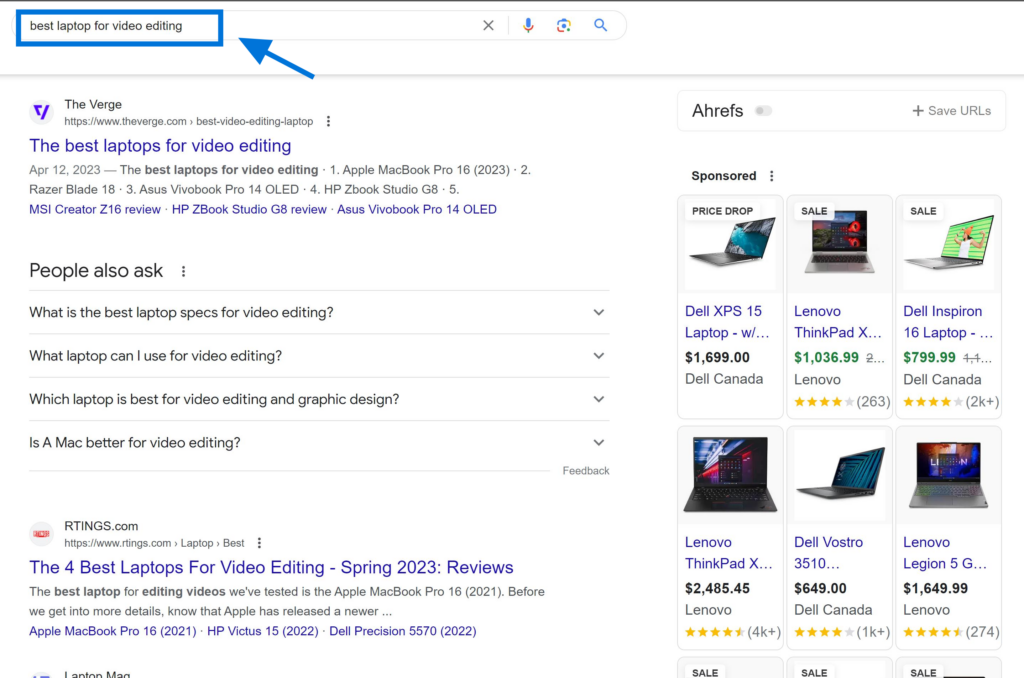
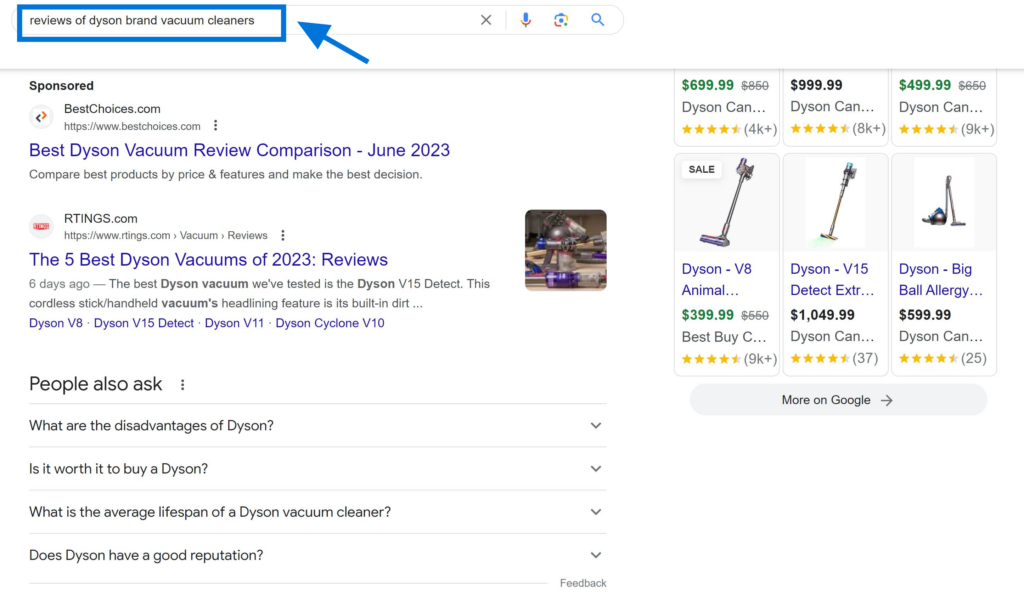
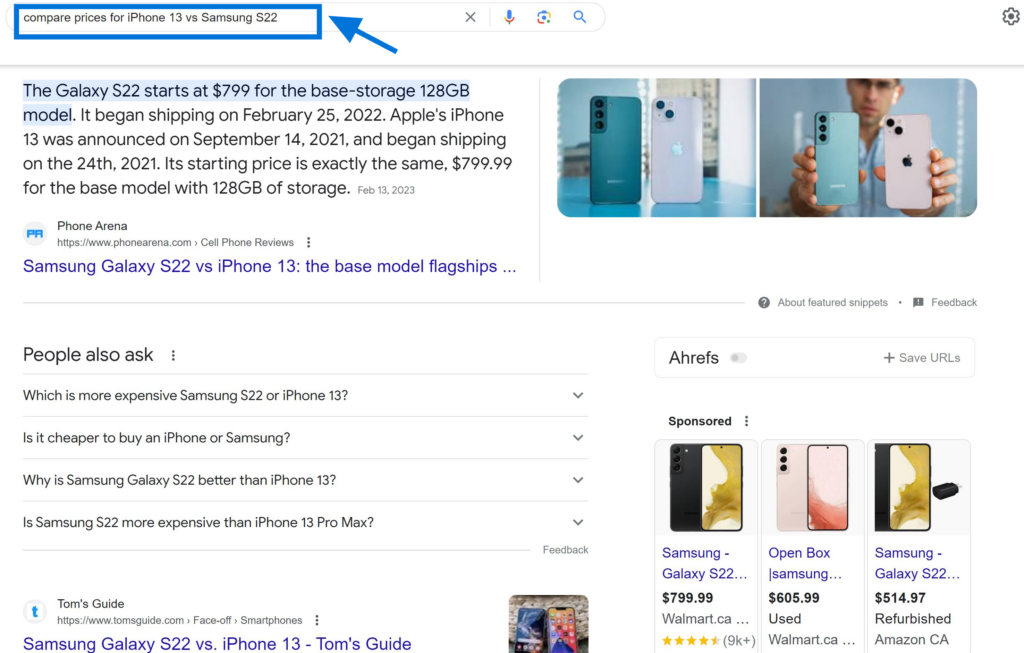
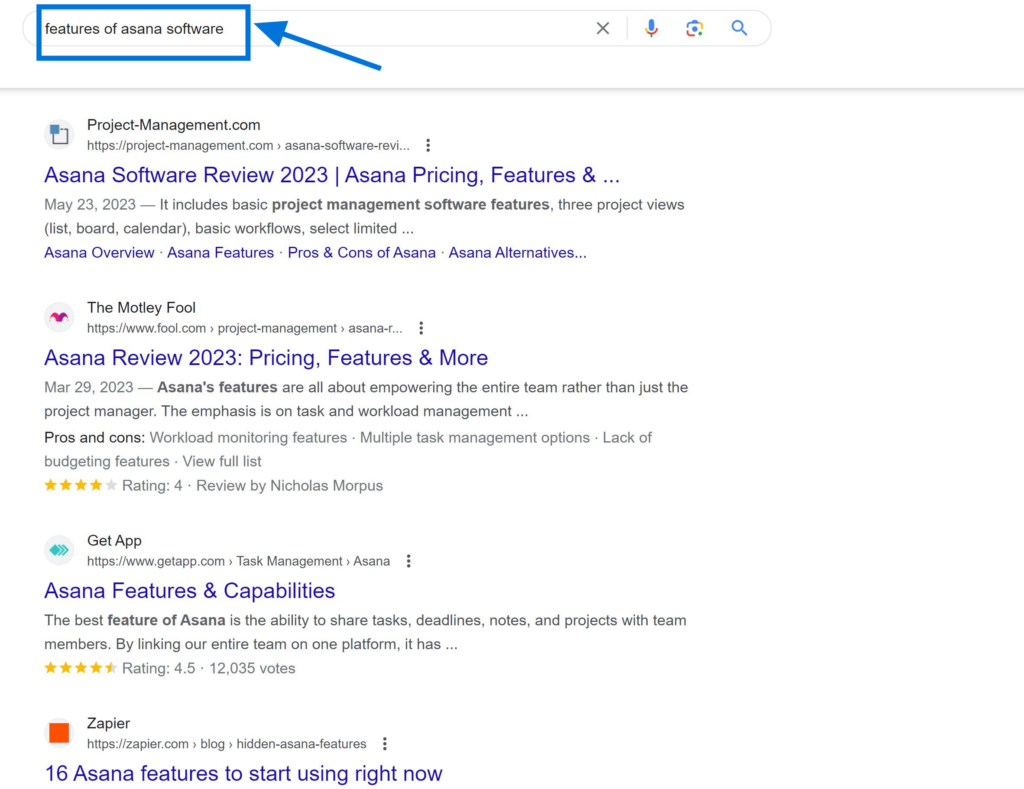
These queries show that the user is interested in information about products or services before purchasing.
The Role of User Needs in Determining Commercial Investigation Search Intent
The key to understanding commercial investigation search intent is recognizing the user’s needs and motivations behind their search.
Users who conduct these types of searches often have specific questions they want answered or problems they need solving.
For example, a potential buyer searching for “best commercial laptop for video editing” may be a professional video editor who needs a powerful computer to handle demanding software for their business.
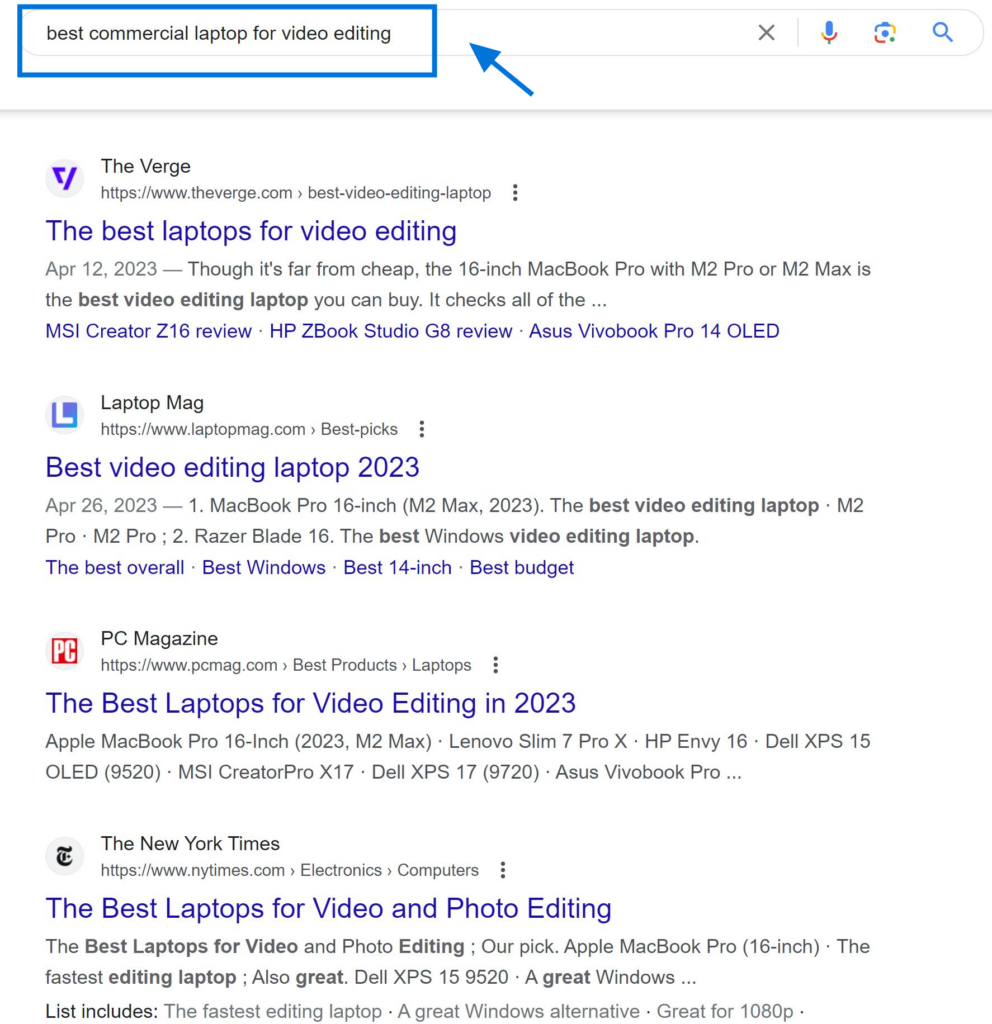
By understanding the user’s commercial intent and buyer intent, businesses can create content that addresses those needs and provides valuable information to the user. Additionally, including an image source of the laptop can further entice the buyer to make a purchase.
Commercial Investigation Search Intent: Characteristics
Understanding the characteristics of commercial investigation search intent is crucial for effective SEO targeting.
By identifying these specific characteristics, you can optimize your website to meet the needs of potential customers and improve your visibility in search results.
Specific Characteristics
A commercial investigation is a type of search intent that involves researching products or services to make a purchase.
Unlike informational intent type or navigational searches, which are focused on obtaining information about a topic or finding a specific website, commercial investigation searches are driven by the desire to find something to buy.
Some specific characteristics that distinguish commercial investigation from other types of search intent include:
- Intent: The primary goal of a commercial investigation is to find a product or service to purchase.
- Target Audience: The target audience for commercial investigation searches includes potential customers who are actively looking for products or services.
- Look for Brand Name: Commercial investigators often search for specific brand names for products or services.
- Comparison Feature: Commercial investigators may compare different brands and products before making a purchase decision.
- Modifiers Usage: Commercial investigators may use modifiers such as “best,” “top-rated,” “affordable,” etc. when conducting their searches.
- Potential Customers: Commercial investigations are conducted by potential customers interested in purchasing a product or service.
Importance of Identifying Characteristics
Identifying these characteristics is important because it allows you to tailor your website content and marketing strategies to meet the needs of potential customers conducting commercial investigations.
By optimizing your site for these types of searches, you can increase your visibility in search results and attract more leads.
For example, if you sell shoes online, knowing that people often conduct commercial investigations using modifiers like “best” or “affordable” can help you optimize your website content to include these keywords.
You could create a post or page titled “Best Affordable Shoes for Women” and include product descriptions and reviews that highlight the affordability and quality of your shoes.
Depending on the search intent types, you could also create pages such as “Comfortable Shoes for Running,” “Stylish Shoes for Work,” or “Durable Shoes for Hiking” to cater to the specific needs of potential customers.
Recognizing Patterns in User Behavior
To effectively target commercial investigation search intent, it’s important to recognize patterns in user behavior related to these types of searches.
Here are some tips for recognizing these patterns:
- Analyze Search Terms: Analyze people’s search terms when conducting commercial investigations. Look for common keyword modifiers or terms that indicate purchase intent.
- Track Competitor Keywords: Track the keywords your competitors are targeting to attract potential customers who are conducting commercial investigations.
- Use Google Analytics: Use Google Analytics to track user behavior on your website. Look for patterns in how users navigate your site and what pages they visit before purchasing.
- Monitor Social Media: Monitor Twitter and Facebook to see what people say about your brand and products.
By recognizing patterns in user behavior related to the commercial investigation, you can optimize your website content and marketing strategies to better meet the needs of potential customers actively looking for products or services.
Understanding User Needs for Commercial Investigation Search Intent
Influence of User Needs on Searches Made by Users with a Commercial Investigative Mindset
Understanding the user’s needs is crucial. The type and specificity of searches made by users with a commercial investigative mindset depend on their needs.
If businesses can understand these needs, they can tailor their content to meet them.
User intent is the reason why someone conducts a particular query or set of queries.
In the case of commercial investigation search intent, users are looking for information that will help them make informed decisions about products or services.
This could include researching a company’s reputation, comparing prices and features, or reading customer reviews.
Businesses must understand these informational searches to create content that meets their audience’s needs. By doing so, they can increase engagement and drive conversions.
Techniques Used by Businesses to Understand Their Target Audience’s Needs
Businesses use various techniques such as surveys, focus groups, and social media monitoring to understand their target audience’s needs. These methods allow companies to gather data on what their customers seek and how they prefer to consume information.
- Surveys: Surveys are an effective way to gather quantitative data on customer preferences and behaviors. They can be conducted online or in person, offering insights into what topics interest customers most.
- Focus Groups: Focus groups provide qualitative data on customer needs and preferences through group discussions led by a moderator. They allow companies to get more in-depth feedback than surveys.
- Social Media Monitoring: Social media monitoring involves tracking conversations about a brand or industry on social media platforms like Twitter and Facebook. Companies can use this data to identify trends in customer behavior and sentiment toward their brand.
Strategies Businesses Can Use To Meet Their Customers’ Needs
Once businesses have identified their target audience’s needs, they can create strategies that meet those needs effectively:
- Create High-Quality Content: Creating high-quality, informative, engaging content will help businesses establish themselves as thought leaders in their industry. This content can be blog posts, whitepapers, or videos.
- Optimize for Search Engines: To ensure that their content is discoverable by users with commercial investigation search intent, businesses must optimize it for search engines. This involves using relevant keywords and phrases in the content and metadata.
- Provide Transparent Information: Providing transparent information about products and services will help build trust with customers. This could include pricing information, customer reviews, or product specifications.
- Offer Personalized Experiences: Offering personalized experiences based on user preferences can increase engagement and drive conversions. For example, businesses could offer personalized product recommendations based on previous purchases or browsing history.
Commercial Investigation Search Intent vs. Commercial Search Intent
Understanding the Differences
Understanding the different types of search intent is crucial. Two types of search intent that businesses need to differentiate our commercial investigation and commercial search intent.
Commercial investigation search intent refers to when a user is researching a product or service with the intention of making a purchase decision in the future.
This type of search intent is characterized by users still in the early stages of their buying journey and looking to gather information about products or services before making a decision.
On the other hand, commercial search intent refers to when a user is actively searching for a product or service with the intention of making an immediate purchase.
This type of search intent is characterized by users who have already decided what they want and are looking for specific information on where to buy it.
To better understand these two types of search intents, let’s take an example:
Suppose you run an online store that sells laptops.
If someone searches for “best laptop 2023,” this would be an example of commercial investigation search intent because they are still researching and gathering information about laptops before making a purchase decision.
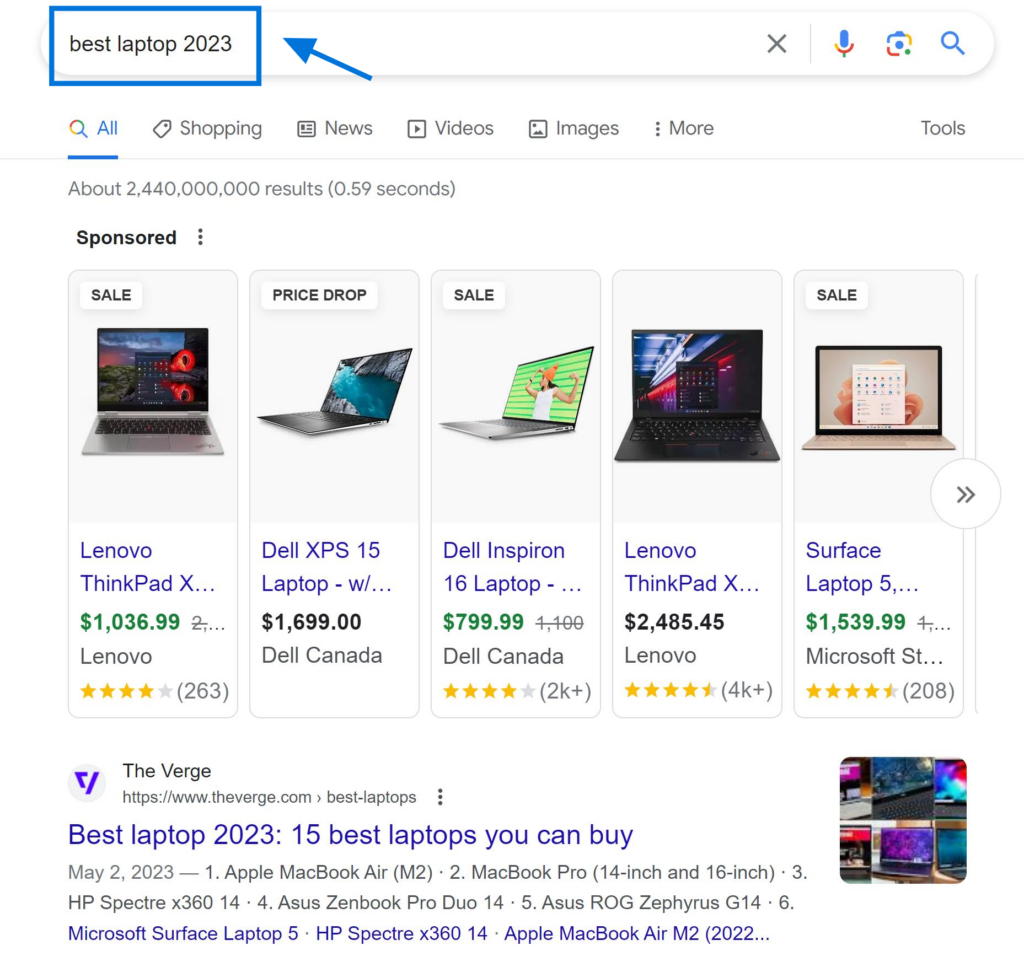
However, if someone searches for “buy MacBook Pro 2023,” this would be an example of commercial search intent because they have already decided to purchase a MacBook Pro. Now they’re looking for specific information on where to buy it.
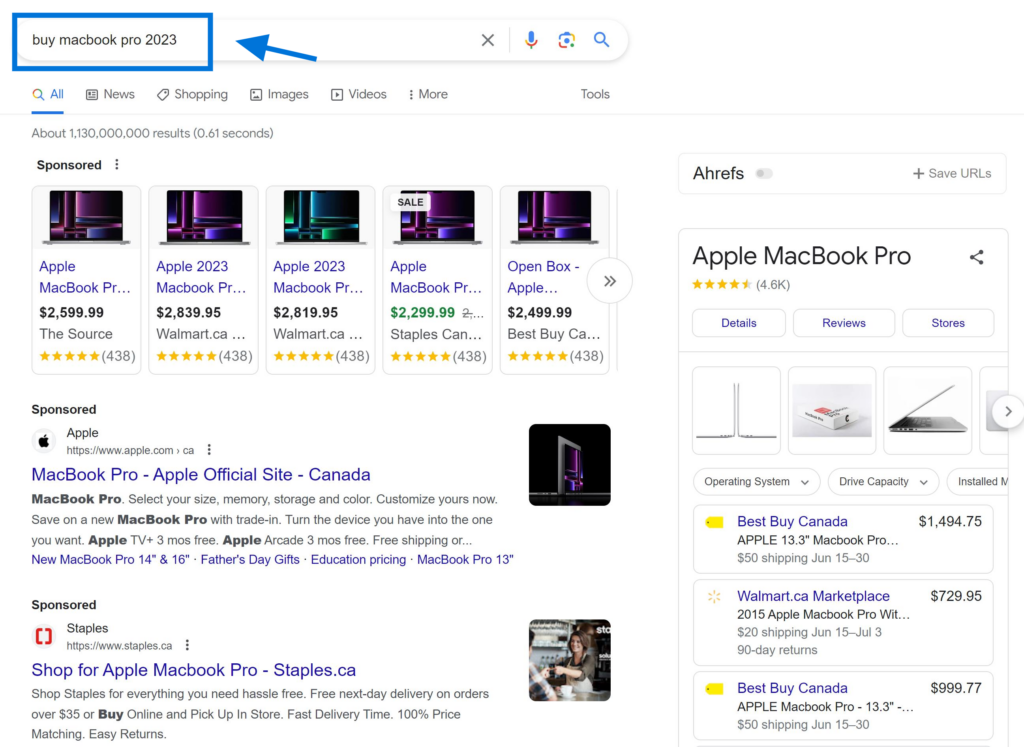
Businesses must differentiate between these two types of intents when developing their SEO strategy because they require different approaches.
For instance, targeting keywords with high commercial investigation intent requires creating content that provides valuable information about products or services without being too salesy.
On the other hand, targeting keywords with high commercial search intent requires optimizing your website’s product pages and ensuring that your website appears at the top of results when users perform such queries.
Identifying and Analyzing Commercial Investigation Search Intent Keywords for SEO
Keyword research is the foundation of any successful search engine optimization (SEO) strategy. It involves identifying and analyzing specific keywords that potential customers use to find products or services related to your business.
Techniques for Identifying High-Value Keywords
There are several techniques marketers can use:
- Brainstorming: Start by brainstorming a list of broad keywords related to your business. For example, if you’re a private investigator, some broad keywords might include “private investigation,” “corporate investigation,” or “background check.”
- Competitor Analysis: Look at what your competitors are doing and which keywords they are ranking for. You can use tools like SEMrush or Ahrefs to see which keywords your competitors are targeting in their content.
- Keyword Research Tools: Use keyword research tools like Google Keyword Planner, Ubersuggest, or Moz Keyword Explorer to find relevant commercial investigation search intent keyword ideas.
- Customer Interviews: Talk with current and potential customers about what they would type into a search engine when looking for products or services related to your business.
- Social Media Listening: Monitor social media channels for conversations related to your industry and take note of the language people use when discussing topics relevant to your business.
Analysis Methods for Potential Keywords
Once you have identified potential commercial investigation search intent keywords, you must analyze them thoroughly before incorporating them into your SEO strategy.
Here are some analysis methods marketers use:
- Keyword Intent: Determine the intent behind each keyword phrase: informational, navigational, or transactional.
- Search Volume & Competition Level: Use tools like Google Keyword Planner or SEMrush to determine each keyword’s monthly search volume and competition level.
- Relevance: Evaluate the relevance of each keyword phrase to your business and target audience.
- Long-tail Keywords: Look for long-tail keywords that are more specific and have less competition.
Tools for Identifying Relevant Keywords
There are several online tools available that can help identify relevant commercial investigation search intent keywords:
- Google Keyword Planner: This tool is free to use and provides data on monthly search volumes, competition levels, and suggested bid amounts for each keyword.
- SEMrush: This tool offers a comprehensive suite of SEO tools, including a keyword research tool that provides data on search volume, competition level, and related keywords.
- Ahrefs: This tool is primarily used for backlink analysis but also has a robust keyword research feature that provides data on search volume, click-through rate (CTR), difficulty score, and related keywords.
- Ubersuggest: This free tool offers data on monthly search volumes, competition levels, related keywords, and content ideas based on your target keyword phrase.
Maximizing SEO Success with Commercial Investigation Search Intent
Best Practices for Optimizing Content Around Commercial Investigative Searches
There are a few best practices that can help you achieve success.
First and foremost, it’s essential to understand the intent behind these searches. People conducting commercial investigative searches typically seek information about a product or service before making a purchase decision.
To optimize your content for these types of searches, you should focus on creating informative and educational content that addresses the questions and concerns of potential customers.
This could include product reviews, buying guides, and comparison articles.
In addition to creating high-quality content, it’s also essential to pay attention to technical SEO factors like page load speed, mobile responsiveness, and structured data markup.
These factors can all impact your website’s visibility in organic search results.
Common Pitfalls or Mistakes Made When Trying to Optimize Content Around This Type of Query
One common mistake businesses make when optimizing their content around commercial investigation search intent is focusing too heavily on keywords.
While it’s essential to include relevant keywords in your content, over-optimizing can hurt your website’s rankings.
Another mistake is neglecting other channels besides organic search.
While Google Ads can be expensive for specific industries with high page bid costs, such as insurance or legal services, they are an effective way to drive targeted traffic to specific landing pages on your website.
Email marketing is another channel businesses often overlook, but it can be highly effective at nurturing leads through the sales funnel.
Tips for Measuring the Success of an SEO Strategy Focused on Commercial Investigation Search Intent
Measuring the success of an SEO strategy focused on commercial investigation search intent requires tracking metrics like organic search traffic, keyword rankings, click-through rates (CTR), bounce rates, conversion rates, and SERP features such as featured snippets or local packs, if applicable.
To get started, you should use a tool like Google Analytics to track your website’s traffic and conversion rates. You can also use tools like SEMrush or Ahrefs to monitor your keyword rankings and track changes over time.
Another critical metric to track is your website’s click-through rate (CTR) in search results. This can give insight into how well your titles and meta descriptions resonate with searchers.
Finally, it’s essential to pay attention to SERP features like featured snippets or local packs, as these can impact the visibility of your website in search results.
Additional FAQs on Commercial Investigation Search Intent
How Do I Identify the Right Keywords for My Business’s Commercial Investigation Search Intent?
Conduct thorough research using tools such as Google Keyword Planner or SEMrush to identify high-volume keywords related to your industry.
Also, consider long-tail keywords that are more specific to the investigative purpose of the user’s query.
Can Optimizing for Commercial Investigation Search Intent Negatively Impact My Website’s Overall Rankings?
No, optimizing for this type of search intent should not negatively impact your website’s overall rankings.
It can help improve your website’s authority and credibility in the eyes of both users and search engines.
How Do I Ensure My Website Provides Valuable Information for Users Searching with Commercial Investigation Search Intent?
Conduct thorough research into what types of information users seek when using this type of query.
Provide comprehensive answers to common questions related to your industry or company history on your website.
Is It Necessary to Have a Separate Landing Page for Commercial Investigation Search Intent Queries?
It is not necessary to have a separate landing page for these types of queries.
Still, creating dedicated pages that provide comprehensive information related to the user’s investigative purpose can be beneficial.
How Can I Measure the Success of My SEO Strategy Targeting Commercial Investigation Search Intent?
Use tools like Google Analytics or Ahrefs to track changes in organic traffic and conversion rates.
Also, monitor your website’s authority and credibility by tracking backlinks and mentions from reputable sources.
Conclusion: Commercial Investigation Search Intent
In conclusion, understanding commercial investigation search intent is crucial for businesses looking to optimize their SEO strategies.
This type of search intent involves users seeking information about a company’s reputation, history, or other investigative purposes.
To maximize SEO success with commercial investigation search intent, it is crucial to identify and analyze relevant keywords and user needs.
It is also essential to differentiate between commercial investigation search intent and commercial search intent, which focuses on transactional search intent rather than investigative ones.
Businesses can improve their online visibility and reputation by implementing effective SEO strategies that target commercial search intent keywords and user needs.
It can lead to increased traffic, higher conversion rates, and ultimately more revenue.
Take action today by thoroughly researching relevant keywords and user needs for your business’s industry. By prioritizing commercial investigation search intent in your SEO strategy, you can gain a competitive edge and attract more potential customers.
